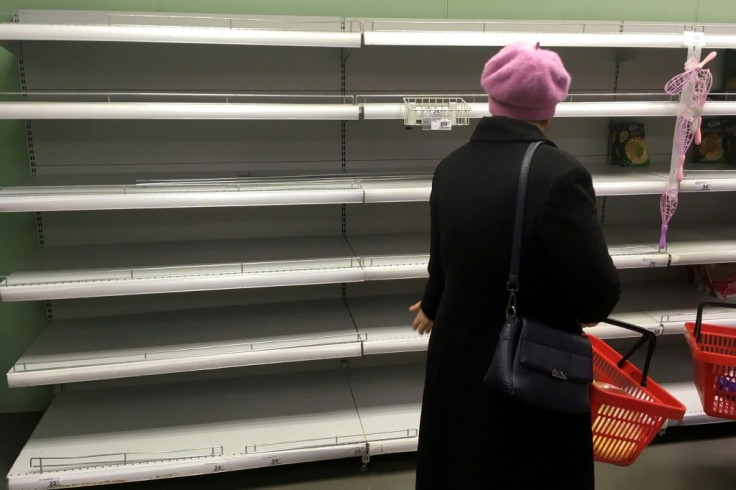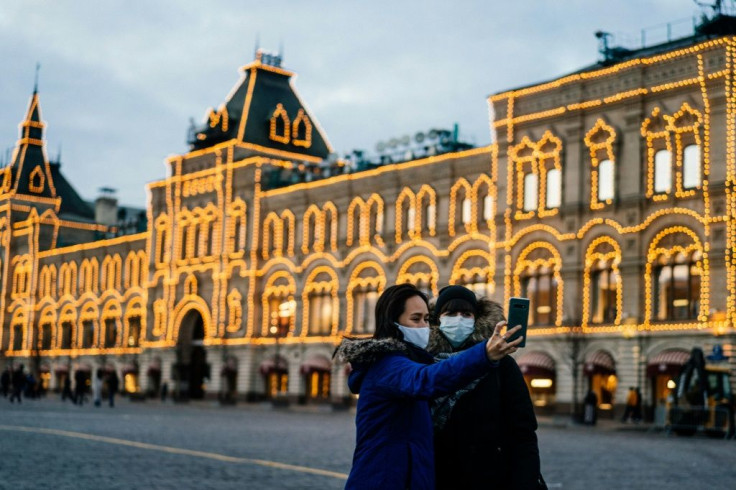Wary Of Official Virus Claims, Russians Brace For Worst
While President Vladimir Putin has reassured the public that the virus pandemic is under control, many Russians instinctively distrust the official claims and fear the true situation is much worse.
They look back to past disasters from the 1986 Chernobyl nuclear explosion to 2010 forest fires, when the initial official reaction was to cover up the truth.
In this case, Russia reacted quickly in late January as the virus epidemic raged in China, closing its border that runs for 4,200-kilometres (miles) and banning entry to most Chinese citizens including tourists.
As late as March 6, Russia had only 10 cases on its soil. But the numbers then began rising swiftly and on a single day on Wednesday leapt by 29 percent to 147.

Putin said Wednesday that "the situation in our country looks a lot better" than in other European countries with thousands of cases.
Touring a centre set up to monitor the pandemic on Tuesday he said the "situation is generally under control" in Russia and outbreaks of infection had been contained.
Yet few of the measures being imposed are national in scale -- except the total closure of entry to foreigners in force from Wednesday.
Moscow, the country's largest city with by far the highest number of cases, and a few other cities have limited the size of public gatherings and ordered school closures. But most Russians are not facing drastic changes to their way of life.
The message that the government is putting out is clear: "There's no reason to panic. And all the measures we are now taking are preventative," said Deputy Prime Minister Tatyana Golikova, who is responsible for health.

Nevertheless, the public anxiety is very real. Since the start of the week, images of empty supermarket shelves have circulated on social media and many have retreated to their dachas, traditional summer houses in the countryside.
"I'm not afraid of this epidemic but I've bought two packs of buckwheat. It's our mentality to distrust what they're saying on television," said 47-year-old Svetlana Andropova, a customer at a supermarket in the second-largest city of Saint Petersburg, stocking up on a traditional staple food.
French hypermarket company Auchan, which has numerous stores in Russia, confirmed to AFP that "there's been growth in the demand for non-perishable goods," while not on the scale seen in western Europe.

Russia's X5 Group, the country's largest food retailer, said it was replenishing stocks of essential foods up to four times as frequently as usual.
Face masks and anti-bacterial hand gel are almost unobtainable in Moscow.
Many question the official number of confirmed cases and believe it is an underestimate.
Anastasia Vasilyeva, president of an independent trade union called the Doctors' Alliance and an ally of opposition leader Alexei Navalny, claims the health authorities are hiding cases by recording them as pneumonia or severe respiratory infections.
Official figures are conflicting. State statistics agency Rosstat says that pneumonia cases went up 37 percent year-on-year in Moscow in January 2020 while the city health department says that rates of pneumonia among out-patients were down 7 and 8 percent in January and February.
Health Minister Mikhail Murashko said that deaths from pneumonia were down by 20 percent in the first months of the year.
The testing methods are also under question. While the state health watchdog says that more than 110,000 tests have been carried out, Moskovsky Komsomolets popular daily questioned their reliability compared to those in other countries, saying that only the severest cases were testing positive.
Sergei, a 29-year-old sports journalist emerging from a Moscow supermarket with two bags of food commented that "living in Russia forces you to think for yourself first of all, try to analyse information from different sources."
Rumours about the virus are circulating quickly and Putin has urged Russians not to believe "fake stories". A centre set up to monitor the crisis is working to identify clusters of false reports on social media and remove them.
On Tuesday, a report that Moscow would shortly be placed in a state of emergency with a nightly curfew circulated widely before being denied.
Russians have responded with typical black humour to the doubts over official accounts.
"As soon as it crosses the Russian border, coronavirus turns into seasonal flu," runs one popular joke.
© Copyright AFP 2024. All rights reserved.





















